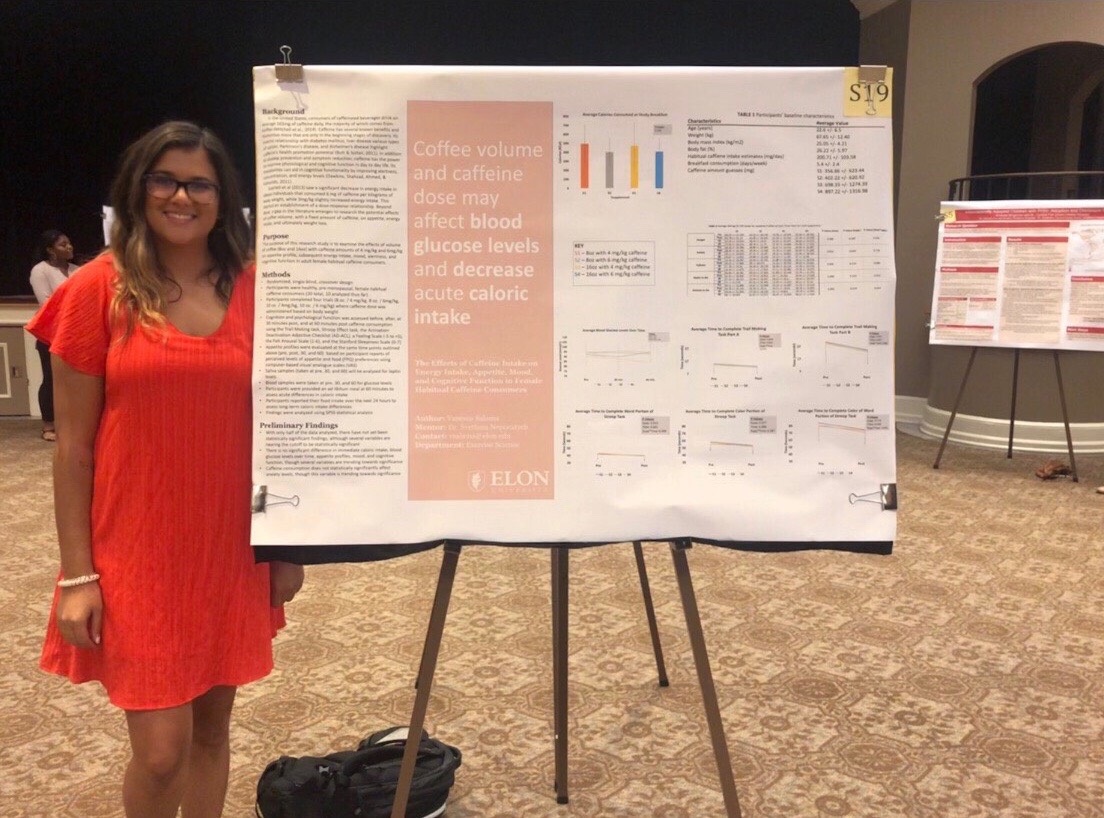Salama, an Honors Fellow, has worked since spring 2018 with Associate Professor Svetlana Nepocatych on her research.
Elon senior and Honors Fellow Vanessa Salama loves coffee. Well, studying coffee and caffeine intake in human participants.
Salama started developing her research project in the spring of 2018 and has been working with Associate Professor of Exercise Science Svetlana Nepocatych. Her project is centered around how caffeine and the volume of coffee affect appetite, affective response, cognitive function, blood glucose levels, hormone levels and subsequent energy intake in female habitual caffeine consumers.
For Salama, researching and working with Nepocatych has helped her think about class material and her field of study in a more sophisticated way that she believes wouldn’t have been the case without it.
“It’s definitely brought my thinking and learning to a higher level,” Salama said.

But one of the most rewarding elements for Salama, however, has been getting to know and work with the faculty and staff at Elon.
“I’ve learned so much more than class material through my personal interactions with the exercise science faculty, and gotten to know them to a way better extent than I ever would have otherwise,” Salama said. “I think I know them all very well, even on a personal level despite not having had half of them as professors yet, or not having them at all.”
Salama remembers flying home from studying abroad in Australia in the fall of 2018 as she was working on her proposal for Elon’s Summer Undergraduate Research Experience (SURE). She remembers having a ‘wow I can’t believe I’m doing this’ moment while on a layover flying back to the United States.
“I couldn’t even tell you where I was,” Salama laughed. “But it just made me feel really proud of myself and accomplished. SURE is an extensive process and I really had to know my stuff, which was really daunting having not being on campus and just having met Dr. Nepocatych before I left that summer.”
Her research has received support not only from Elon faculty and staff as well as a grant from Glen Raven and Honors Program. She spent the summer of 2019 collecting data at Elon and working with human research participants. During the fall semester, Salama analyzed results from the data she collected during SURE and found that there was no significant difference between the two different doses and volumes of coffee and caffeine they tested.
“There’s no difference, which does not mean it’s not a result necessarily,” Nepocatych said. “But it means between those two doses in two volumes, there’s no difference in appetite or glucose response or energy intake.”
Now Salama and Nepocatych are in the process of drafting a manuscript to submit to a peer-reviewed journal. Salama and Nepocatych has been scheduled to travel to San Francisco, California, in May to present at the American College of Sports Medicine’s 2020 conference before the COVID-19 pandemic derailed those plans.
Although Salama says her experience with undergraduate research has not always been easy –– from the early morning sessions with her research participants to the process of re-writing drafts and pouring hours into research on top of classes, other commitments and life –– the experience has been worth it.
“Then I think about the people I’ve met, the relationships I’ve formed, and the constant support I get from my department,” Salama said. “I remember how lucky I am to do research that I love at a school that I love with faculty that feels like family.”



